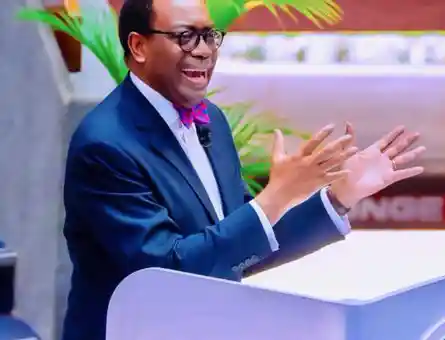Adesina Warns: Nigeria’s GDP Per Capita Now Worse Than 1960, Urges Urgent Economic Reforms
- Advertisement -
Nigeria’s GDP Per Capita Drops to $824: AfDB President Akinwumi Adesina Raises Alarm Over Deepening Economic Regression
The President of the African Development Bank (AfDB), Dr Akinwumi Adesina, has delivered a sobering assessment of Nigeria’s economic state, warning that the country’s economic performance has deteriorated drastically since independence in 1960.
Speaking at a high-profile economic forum, Dr Adesina declared that Nigeria’s Gross Domestic Product (GDP) per capita has plummeted from $1,847 in 1960 to a mere $824 today, a sharp decline that paints a bleak picture of the nation’s developmental trajectory.
- Advertisement -
“Our GDP per capita in 1960 was $1,847. Today, it stands at $824. Nigerians are worse off than 64 years ago,” Adesina declared.
Stagnation and Decline Despite Natural Wealth
Nigeria, Africa’s most populous country and one of its richest in natural resources, has faced decades of economic mismanagement, policy inconsistency, corruption, and overreliance on oil exports. Despite periods of GDP growth, much of it has not translated into real improvements in living standards for the majority of Nigerians.
- Advertisement -
Dr Adesina’s remarks spotlight a disturbing reality: economic progress in nominal terms has failed to improve individual welfare.
Also Read : Inside EFCC’s Money Laundering, Ponzi Scheme Case Against Aisha Achimugu As N58m Refunded
Key Highlights from Adesina’s Statement
- Advertisement -
- Historical comparison: GDP per capita in 1960 ($1,847) vs. today ($824)
- Economic regression: Despite population and infrastructure growth, purchasing power and income equality have worsened.
- Call to action: The AfDB president stressed the need for structural reforms to halt Nigeria’s economic decline.
Causes of Economic Backslide
Several factors have been blamed for this downward trend in per capita income:
- Rapid population growth without corresponding economic expansion
- Overdependence on oil revenues, making the economy vulnerable to price shocks
- Inflation and currency devaluation, particularly after the COVID-19 pandemic and recent Naira reforms
- Weak industrial base and limited value-addition in exports
- Poor governance, corruption, and policy instability
Adesina Calls for Urgent Structural Reforms
- Advertisement -
Dr Adesina emphasized the urgency of revamping Nigeria’s economic model, which has failed to yield tangible improvements in citizens’ welfare. He advocated:
- Diversification of the economy into agriculture, manufacturing, and digital technology
- Investment in human capital development — especially education, healthcare, and vocational skills
- Strengthening institutions and governance frameworks
- Building resilient infrastructure to support industrialization and regional trade
The Reality on the Ground: Rising Poverty and Insecurity
Nigeria currently has over 133 million people living in multidimensional poverty, according to the National Bureau of Statistics (NBS). Food inflation has reached record highs, and unemployment remains a major issue, particularly among the youth.
Economic hardship is further compounded by insecurity, fuel subsidy removal, high electricity tariffs, and a weakening Naira, all of which erode purchasing power and exacerbate social tension.
Experts Weigh In: Nigeria at a Crossroads
Economists and policy analysts have echoed Dr Adesina’s concerns, warning that without decisive action, Nigeria risks further deterioration.
Dr. Ngozi Okonjo-Iweala, Director-General of the World Trade Organization, previously noted that “growth without inclusive development is unsustainable.”
Local analysts urge the government to implement bold reforms in line with the AfDB’s recommendations. Failure to address the underlying issues could see Nigeria slipping further down global development rankings.
Government Response Yet to Come
As of the time of reporting, no official response has been issued by the Nigerian government regarding Adesina’s remarks. However, the Ministry of Finance and Economic Planning is expected to respond to growing public pressure for reforms.
A Wake-Up Call for Nigeria’s Leadership
Dr Akinwumi Adesina’s blunt economic diagnosis serves as a wake-up call for policymakers, economists, and stakeholders. The need to reengineer Nigeria’s economic foundation has never been more urgent.
With GDP per capita now lower than it was 64 years ago, the Nigerian government must take immediate steps to implement inclusive, sustainable, and transparent economic reforms or risk a continued slide into poverty and instability.
- Advertisement -


